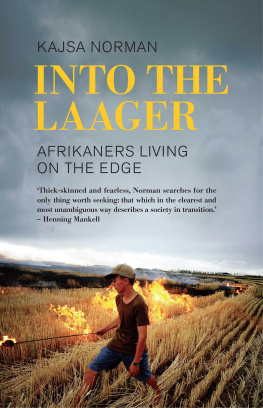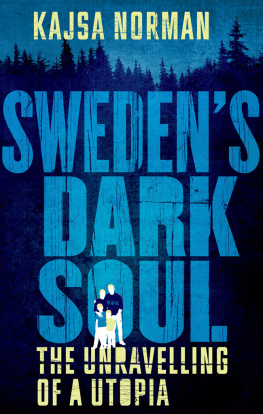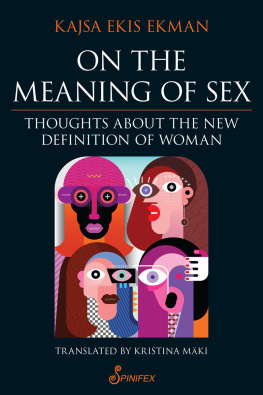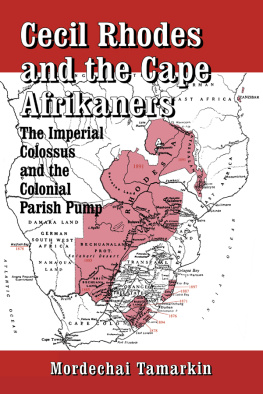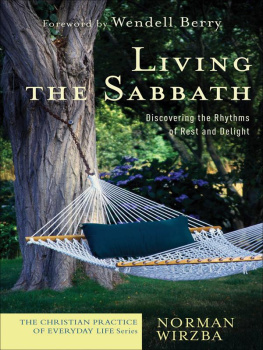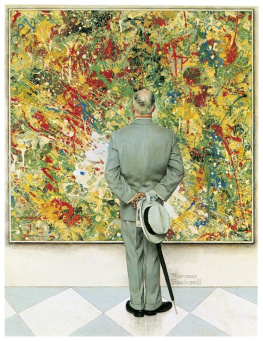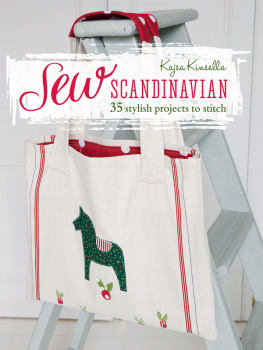KAJSA NORMAN
Into the Laager
Afrikaners living on the edge
JONATHAN BALL PUBLISHERS
Johannesburg & Cape Town
We have triumphed in the effort to implant hope in the breasts of the millions of our people. We enter into a covenant that we shall build the society in which all South Africans, both black and white, will be able to walk tall, without any fear in their hearts, assured of their inalienable right to human dignity a rainbow nation at peace with itself and the world ...
Never, never and never again shall it be that this beautiful land will again experience the oppression of one by another and suffer the indignity of being the skunk of the world.
Nelson Mandela, inauguration as President of South Africa
10 May 1994, Pretoria
Authors note
SOUTH AFRICANS live in a country where mutually annihilating truths coexist entirely amicably, writes Rian Malan in his introduction to Resident Alien . His argument, in short, is that although the facts of any given story might be correct, one persons truth is always another persons lie.
I am certain that this coexistence of competing truths is the case in my story too. In South Africa, Im not even a Resident Alien, but rather a complete alien, with no direct ties to the land. So, as an outsider, what makes my observations relevant?
I believe that all people are more or less blind to their own culture. Certainly, it has taken a decade away from my native Sweden for me to slowly begin to notice the peculiarities of my own culture; to realise that there are few things more Swedish than the naivet displayed by our leading politicians when they claim there is no such thing as Swedish culture.
We are all products of our history, culture and context. They play a crucial role in determining our dreams and our fears. But sometimes it takes a perceived threat for a society to articulate its narrative and its values. And, frequently, it is not until we articulate something that we become fully aware of it.
By virtue of being an alien, of not being marked by South Africas troubled and complex history, I hope Ive been able to identify and give voice to some of the patterns and fears that characterise Afrikaner culture.
I lived in South Africa between 2011 and 2012 and it was during this time that most of my interviews and reportage took place. As such, certain facts or statistics may have changed, as well as the circumstances of some of the individuals portrayed in the book. Where relevant, I have updated the text to include more recent developments, but mostly the chapters provide snapshots of given moments and, as such, must remain unaltered.
It is also important to note that some of the names of individuals have been changed in order to protect their privacy. Id like to thank all those who shared their stories and perspectives with me. Without their openness and honesty, this book could not have been written.
Id also like to thank my husband Matthew for invaluable support and input, my editors and publishers in Sweden, the UK and South Africa: Olav Fumarola Unsgaard, Moa Elf Karln, Michael Dwyer, Jeremy Boraine and Sophy Kohler, for believing in this book and helping to make it better. But most of all Id like to express my gratitude to the late Henning Mankell who shepherded this story from start to finish. He kept me from giving up and insisted that this is an important story, relevant not only for South Africans, but for multicultural societies the world over.
I hope that you, the reader, will agree.
KAJSA NORMAN
London, July 2016
Prologue
15 December 2011. Banks of Blood River.
An army of black clouds amasses on the distant hills. The air is tense as nature prepares for battle. Im standing in an open field in KwaZulu-Natal, somewhere between the small towns of Dundee and Vryheid. Through these lands cut the muddy waters of Blood River.
I unpack my borrowed tent. The roof is ripped. The little aluminium pegs look like recycled coat hangers. During last nights blistering storm, thunder detonated around me like bombs. While I stayed in a solid wooden bungalow in the lush hills of Zululand, the wind rattled the windows and made the walls tremble. If tonights storm is half as fierce, tomorrow theyll find pieces of my tent in Madagascar.
As I look around in bewilderment, a group of sturdy-looking men approach. They greet me in Afrikaans and proceed to ask me a series of questions I dont understand. Ive been warned that English speakers arent popular around these parts; that I should lie low and try to blend in. So much for that.
Do you have family here? the tallest one asks, in a thick accent.
No. Im a journalist. Im writing about South Africa and was hoping I could sit in on the celebrations.
They eye me suspiciously and talk among themselves.
To learn more about Afrikaner culture, I add tentatively.
Still no response.
Are you English? they ask.
No, I reply. Swedish.
And that seems to help, because their eyes move from me to my cheap equipment, and they sigh with the realisation that Im entirely at their mercy.
After conferring with one another for a few minutes they set off back to their camps. When they return, arms full of tools, the tension has dissipated. They get to work, disposing of my useless tent pegs and driving massive iron bars so far into the earth that I fear Ill never get them out again. Then they patch up the rip and tie my tent to a tree. I try to thank them, but they wont have it.
Its not for you, its for us. So we wont have to come rescue you from the middle of the river in the middle of the night. Thats happened before, you know. Dont think your tent cant go flying just because youre in it.
Do you get a lot of storms? I ask, steering the conversation away from my camping prowess.
Almost every day at this time of year, says the tall one, and he motions at their own camps securely tied down with thick ropes and iron hooks. Its clear a little bad weather isnt going to scare anyone off around these parts.
It is December 15, the day before the annual commemorations of the Battle of Blood River. Although celebrations are held at various locations across South Africa, many Afrikaner families have travelled from all over the country to this remote holy ground. Some spend as much as a week here, indulging in curious traditions. They play the 200-year-old Boerevolk sport of jukskei , where participants throw the wooden pins from oxen yokes at a stick planted in the ground. They gather mud in buckets from the river and compete to build the best clay oxen sculpture. They play traditional folk music on accordion and guitar. They pray. And they braai.
When the men are finally done with my campsite, it would take a tornado to dislodge it. The big guy extends his hand and, for the first time, he smiles.
Marius, he says. Marius Verster. Welcome to Blood River.
Chapter 1
Rise of the suburban fortress
The barbarian tribes were arming, the rumour went; the Empire should take precautionary measures, for there would certainly be war.
Of this unrest I myself saw nothing. In private I observed that once in every generation, without fail, there is an episode of hysteria about the barbarians. There is no woman living along the frontier who has not dreamed of a dark barbarian hand coming from under the bed to grip her ankle, no man who has not frightened himself with visions of the barbarians carousing in his home, breaking the plates, setting fire to the curtains, raping his daughters. These dreams are the consequence of too much ease. Show me a barbarian army and I will believe.

